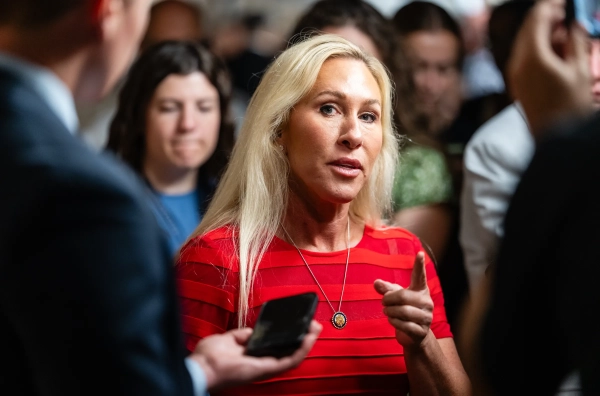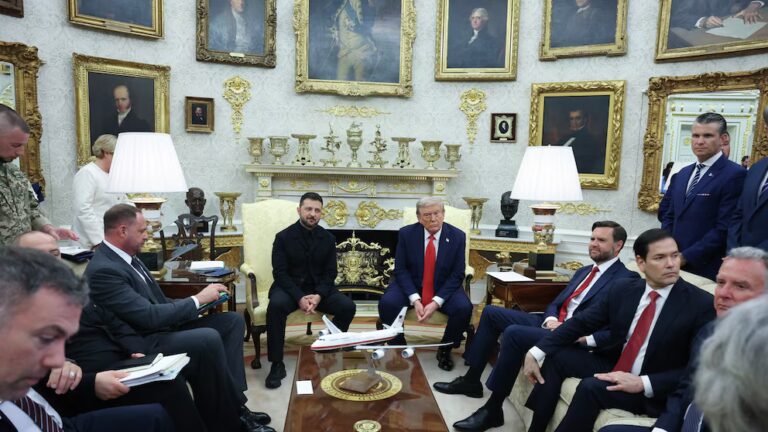
Gina Haspel, President Trump’s nominee to take the top job at the CIA now that Mike Pompeo has become secretary of state, is — in case you haven’t heard — a woman.
She’s controversial because of her role in Bush-era torture, which many people worry would be retroactively blessed by her elevation to such a lofty role. Trump, of course, ran for office as an open advocate of bringing back Bush-era torture, and when as president he backed away from that position, he was clear that he was doing so only on the say-so of Defense Secretary James Mattis rather than because he’d had any change of heart on the underlying substance. Agree or disagree with Trump’s effort to relegitimize routine torture, the fact that he favors doing so is clearly an important reason why he’s made a nomination that torture opponents fear would relegitimize torture.
Related
Gina Haspel, Trump’s controversial pick for CIA director, explained
But Haspel, the current deputy director of the CIA, is, as Trump is at pains to say, “a woman.”
The strange thing about the argument that Trump deserves feminist cred for breaking the CIA glass ceiling is that not only is it wrong, but it’s clearly something Trump himself does not believe in.
Trump did not appoint Haspel as part of a larger effort to increase women’s representation at senior levels of the US government because there is no such larger effort. There is no such larger effort because the question of whether women’s representation at senior levels of government is a socially important goal to try to advance is a subject of ongoing political dispute, in which Trump is on the side that says it is not important.
Everyone — Trump, his allies, his enemies, and the journalists covering this controversy — knows this, just as everyone knows that while Haspel will probably be confirmed, she certainly won’t be confirmed because hardcore feminists rally to her cause. They’re just trolling, a rhetorical mode that’s become increasingly central to conservative politics in America.
Conservatives have a caricatured view of feminism
The dominant rhetorical mode on the right about Haspel and gender representation isn’t that this is actually a good reason to vote for her confirmation, but rather that progressives allegedly ought to think that it’s a good reason.
White House press secretary Sarah Huckabee Sanders, for example, argues that only “a total hypocrite” could oppose her since Democrats say they “support women’s empowerment” and Haspel is a woman.
Obviously, a person can both support women’s empowerment and oppose torture. Such a person would conclude that there are many women who might receive presidential appointments and only very few women who were directly involved in Bush-era torture, and thus that with values in conflict, the sensible thing to do is to oppose Haspel.
This is, of course, so obvious as to hardly be worth saying, which is why Fox & Friends host Pete Hegseth simply voices the troll argument with mock incredulity as his preferred device.
Conservative commentator and consultant Ben Howe, meanwhile, helpfully drops the levels of irony to put the point squarely. He’s not saying that substantive objections to Haspel should be overridden because she’s a woman; he’s saying that progressives would be saying this about a hypothetical different woman appointed to the job by a different president.
Howe is possibly correct about this.
But there’s a big difference — most progressives actually do care about women’s representation in elite government posts and behave accordingly, which is why they would make an issue out of this in confirmation fights.
Progressives (mostly) care about representation; conservatives don’t
As a candidate in 2016, Hillary Clinton promised to appoint a Cabinet that was at least half women.
That was a path-breaking pledge in the context of American political history, but also one that’s gaining increasing steam among progressive political parties around the world. Canadian Prime Minister Justin Trudeau committed to a half-female Cabinet and then delivered one, as did Prime Minister Stefan Löfven in Sweden and French President Emmanuel Macron. Jacinda Ardern, the prime minister of New Zealand, is a woman and also the first democratically elected head of government to give birth to a child while in office, but she’s come under criticism for women’s underrepresentation in her Cabinet.
In the United States, too, there is a systematic partisan difference here. Obama did not deliver the kind of gender-equal Cabinet that Clinton promised, but he did have more women in his Cabinet than any previous president, which broke a record that had previously been set by Bill Clinton. The first female Cabinet secretary was appointed by Franklin Roosevelt, and the first president to have multiple women serve in his Cabinet simultaneously was Jimmy Carter.
Obama also put two women on the Supreme Court (the most of any president, bringing the total number of female justices to an all-time high) and appointed the first female chair of the Federal Reserve (Trump fired her while conceding that she’d done a good job).
All of which is to say that in the US and around the world, progressive political parties have generally made gender representation at elite levels of government a significant priority. The trend is increasingly for left-of-center politicians to promise to set new records in terms of women’s representation, and the exceptions to that rule (like Ardern in New Zealand) both face internal criticism for it and have specific reasons they can get away with it. Left-of-center parties believe both that women have historically been discriminated against in obtaining these kinds of jobs, and also that high-level representation has spillover and trickle-down effects for society at large.
Conservative troll feminism fundamentally misses this. You can tell that Trump doesn’t prioritize increasing women’s representation because at essentially all levels — from Cabinet picks to judicial picks to US attorney picks and beyond — he is in fact decreasing women’s representation. This is a topic on which the parties have a substantive disagreement, just as they disagree on taxes and abortion and climate change and torture.
But Trump, Sanders, Howe, Hegseth, and others fundamentally miss this, deploying bad-faith arguments in what they wrongly believe to be a mirror image of progressive rhetoric in order to highlight a hypocrisy that does not exist.
The true test of whether Democrats believe their rhetoric about women’s empowerment isn’t whether they are willing to vote for a woman nominee who they don’t like — it’s whether they are willing to prioritize finding and appointing women they do like when they have a chance to govern. Democrats do this and Republicans don’t, because Democrats think this is important and Republicans don’t.
Sourse: vox.com






